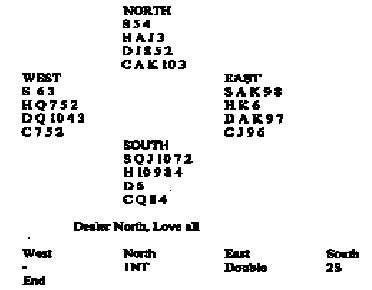|
Bridge
David Bird
 East
doubled INT for penalties. When South ran to a suit that East had well
held, you might expect him to double again. Knowing, from his partnerís
pass, that there was a weak hand opposite, he decided to pass. West led
a diamond to Eastís king and back came a low diamond, attacking
declarerís trump holding. How would you play the hand? The original
declarer ruffed, crossed to dummy with a club, and led a trump. Not the
best. East rose with the king and played another diamond. Declarer had
now lost control of the hand. He conceded four trump tricks, one heart
and one diamond, going one down. It seemed a powerful line of defence,
forcing the South hand in diamonds, but in fact it gave declarer a
chance to succeed. After ruffing the second diamond, he could cross to a
club and ruff another diamond. Returning to dummy with another club, he
could ruff dummyís last diamond. The queen of clubs would stand up and
he could then promote another trump trick for Southís Q-J holding.
Look back to Trick 2. There is only one, very surprising, defence to
beat the contract. East must switch to the king of hearts, removing a
key entry for the trump reduction. East
doubled INT for penalties. When South ran to a suit that East had well
held, you might expect him to double again. Knowing, from his partnerís
pass, that there was a weak hand opposite, he decided to pass. West led
a diamond to Eastís king and back came a low diamond, attacking
declarerís trump holding. How would you play the hand? The original
declarer ruffed, crossed to dummy with a club, and led a trump. Not the
best. East rose with the king and played another diamond. Declarer had
now lost control of the hand. He conceded four trump tricks, one heart
and one diamond, going one down. It seemed a powerful line of defence,
forcing the South hand in diamonds, but in fact it gave declarer a
chance to succeed. After ruffing the second diamond, he could cross to a
club and ruff another diamond. Returning to dummy with another club, he
could ruff dummyís last diamond. The queen of clubs would stand up and
he could then promote another trump trick for Southís Q-J holding.
Look back to Trick 2. There is only one, very surprising, defence to
beat the contract. East must switch to the king of hearts, removing a
key entry for the trump reduction.
What would you say now?
Answer
 Partner
has shown a weak hand with a long club suit. You are weak too and have
some club support. Under the old scoring table, players would jump to 5C
on such a hand, not particularly worried about any penalty they might
suffer because the opponents could usually have done better playing the
hand themselves somewhere. Nowadays 5C could be very expensive. If you
make a psychic response, such as 3H or 3S, you could end up in 5C
anyway. I would pass on the hand. Partner
has shown a weak hand with a long club suit. You are weak too and have
some club support. Under the old scoring table, players would jump to 5C
on such a hand, not particularly worried about any penalty they might
suffer because the opponents could usually have done better playing the
hand themselves somewhere. Nowadays 5C could be very expensive. If you
make a psychic response, such as 3H or 3S, you could end up in 5C
anyway. I would pass on the hand.
Awards: Pass-10, 4C-7,
5C-4, 3S or 3H (psychic bid)-3.
ó Knight Features
|